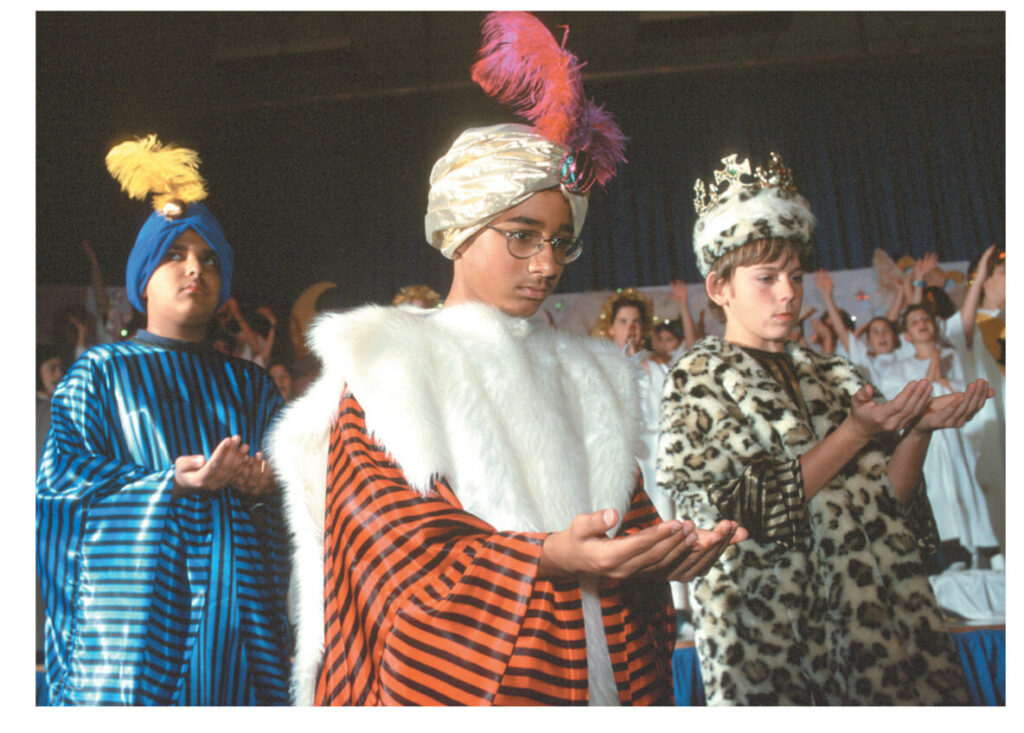
The gospel tells us little about the foreigners who come to worship Jesus. Matthew’s story calls them astrologers, or magi, a kind of combination of scholar and soothsayer or diviner. They read the stars to look for the hand of God. When they discover a star they have never seen before, they leave their homes in the East to see what it means.
What the gospel does not tell us about magi, we have added over the centuries. We have made the astrologers into kings. Because the gospel mentions three gifts—gold, frankincense, and myrrh—we count them three. We have given them names, ages, and skin color. Melchior is the old man with white hair and a white beard; Balthazar is young and fair; Gaspar is black. We haven’t made one of them a woman, although many think there must have been a woman along since they stopped to ask directions!
Why have we added so much detail to these stories and left the shepherds such a plain group? Maybe because the strangers take such a big risk in following the star. They leave the comforts of their homes, take a long trip, and outwit a king anxious for his crown. They don’t know where they are going or what they will find when they get there. In other words, they are model believers and seekers of truth.
Faith is always a venture into the unknown. Faith is letting the Spirit come into our comfortable lives and shake us up. These magi follow in the footsteps of Abraham and Sarah, who also left their own land to follow God’s revelation. The magi find Jesus by using their talents and the science available to them.
- Where have you journeyed to transcendent meaning for your life? What did you find?
- What takes most of your thinking, planning, wishing, and hoping time and energy? Are you finding God there?
Did the visit of the astrologers really happen? Most scholars don’t think so. Rather, the story of their visit is early Christians’ way to imbue Jesus’ birth with as much significance as his death and resurrection. The birth stories of other rulers, such as Alexander the Great, include celestial phenomena. In Israel’s tradition, an earlier diviner from the East named Balaam prophesies, “A star shall come forth out of Jacob, and a scepter arise out of Israel” (Numbers 24.17).
More importantly, it is Matthew and only Matthew who tells the magi story and Matthew who ponders Jesus’ rejection by so many of his own and acceptance by Gentile peoples. By the time Matthew writes—the A.D. 80s—Paul and other missionaries have founded Christian communities in Gentile cities around the Mediterranean area. Also, the Romans have put down the Jewish uprising that culminated in the destruction of the Second Temple and the siege of Masada.
These cataclysms have repercussions in every phase of Jewish life. The temple as a unifying place of worship is gone. Jewish men and women who believe in Jesus become less welcome in synagogues. The story of the magi, which Matthew puts at Jesus’ birth, foreshadows in a literary way the split between Jews who follow Jesus and other Jews.
By their appearance in Jerusalem, the astrologers offer Herod and the priests and elders two choices—come with us to see the new king or reject him. Herod doesn’t show his hand at once, but later we see his intent is murderous. Herod wants to keep everything comfortable for himself.
The priests and elders of the people don’t follow the magi to Bethlehem. We can assume a new revelation of God does not interest them. Those who represent palace and temple care more about keeping their positions secure.
Who is to say what any of us would do? Who wants to leave the comfort of the status quo? The magi ask us a faith question. Can we see God beckoning us to new lands and new life?
Matthew concludes this story by telling us that upon learning that Herod had set a trap for them, the astrologers went home by another way. Being strangers, they had no need or obligation to make peace with the powers that be. They didn’t have to accept Herod’s terms. They didn’t give up in despair and bitterness. They just found another way home.
- When have you clung to the past beyond all reason?
- How do you hope and imagine God coming to us from the future?
- What is an interest that never lets you go, that you continue to pursue?
